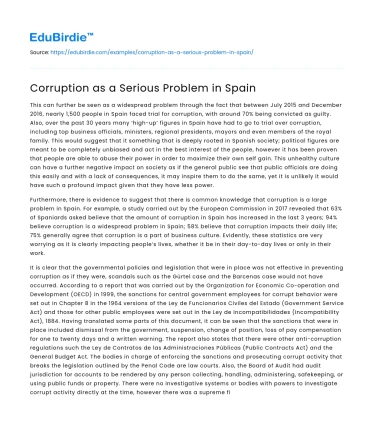This can further be seen as a widespread problem through the fact that between July 2015 and December 2016, nearly 1,500 people in Spain faced trial for corruption, with around 70% being convicted as guilty. Also, over the past 30 years many ‘high-up’ figures in Spain have had to go to trial over corruption, including top business officials, ministers, regional presidents, mayors and even members of the royal family. This would suggest that it something that is deeply rooted in Spanish society; political figures are meant to be completely unbiased and act in the best interest of the people, however it has been proven that people are able to abuse their power in order to maximize their own self gain. This unhealthy culture can have a further negative impact on society as if the general public see that public officials are doing this easily and with a lack of consequences, it may inspire them to do the same, yet it is unlikely it would have such a profound impact given that they have less power.
Furthermore, there is evidence to suggest that there is common knowledge that corruption is a large problem in Spain. For example, a study carried out by the European Commission in 2017 revealed that 63% of Spaniards asked believe that the amount of corruption in Spain has increased in the last 3 years; 94% believe corruption is a widespread problem in Spain; 58% believe that corruption impacts their daily life; 75% generally agree that corruption is a part of business culture. Evidently, these statistics are very worrying as it is clearly impacting people’s lives, whether it be in their day-to-day lives or only in their work.
Save your time!
We can take care of your essay
- Proper editing and formatting
- Free revision, title page, and bibliography
- Flexible prices and money-back guarantee
It is clear that the governmental policies and legislation that were in place was not effective in preventing corruption as if they were, scandals such as the Gürtel case and the Barcenas case would not have occurred. According to a report that was carried out by the Organization for Economic Co-operation and Development (OECD) in 1999, the sanctions for central government employees for corrupt behavior were set out in Chapter 8 in the 1964 versions of the Ley de Funcionarios Civiles del Estado (Government Service Act) and those for other public employees were set out in the Ley de Incompatibilidades (Incompatibility Act), 1884. Having translated some parts of this document, it can be seen that the sanctions that were in place included dismissal from the government, suspension, change of position, loss of pay compensation for one to twenty days and a written warning. The report also states that there were other anti-corruption regulations such the Ley de Contratos de las Administraciones Públicas (Public Contracts Act) and the General Budget Act. The bodies in charge of enforcing the sanctions and prosecuting corrupt activity that breaks the legislation outlined by the Penal Code are law courts. Also, the Board of Audit had audit jurisdiction for accounts to be rendered by any person collecting, handling, administering, safekeeping, or using public funds or property. There were no investigative systems or bodies with powers to investigate corrupt activity directly at the time, however there was a supreme financial audit authority, an agency coming under the Intervención General de la Administración del Estado (Economic Affairs and Finance Ministry), which monitored all of the financial dealings of branches of central government. It is evident that the actions of this agency were not sufficient in order to detect the illegal cash donations received by Luis Barcenas, recorded using a parallel bookkeeping method. In order to deter and prevent corrupt practices on top of the sanctions, the General Budget Act allowed the inspection of all dealing that gave rise to financial rights, with the inspection being carried out by the Intervención General de la Administración del Estado at any time. In addition, ethics courses were provided for government officials at all levels, covering topics such as the principles of ethics, ethics and law, the constitutional significance of public service, analysis of public conduct, ethics in public organizations and ethical values and administrative culture. It is important to note that these policies are on a national level and there may be some additional separate regulations that vary depending upon autonomous community.
Not only is it apparent that the past governmental legislation that was in place was fairly ineffective and lacking, the guidance and training for public officials and politicians also did not provide a sufficient disincentive to completely deter people away from corrupt actions. Given this information, one may argue that the most efficient way to combat this problem is through tighter governmental legislation with greater disciplinary measures, as this may provide the largest incentive to not engage in these activities that bring private gain at the expensive of the general public.
Following the recent scandals, legislation has been adapted and improved in an attempt to faze out corruption from the Spanish government as well as the whole society. The Spanish Criminal Code establishes corruption in international business transactions as an autonomous crime, which can be located under Article 286. With respect to domestic bribery, Articles 419 to 426 of the Criminal Code outline that public officials that commit bribery by receiving a bribe (passive bribery) will be punished, as well as those who issue the bribes (active bribery). These anti-bribery laws are relatively strict, with the Criminal Code not providing any exception for gifts, travel expenses, meals or entertainment; any goods or compensations, despite their economic value, fall under the scope of the legislation against bribery.






 Stuck on your essay?
Stuck on your essay?

